- Home
- Neal Stephenson
Quicksilver Page 35
Quicksilver Read online
Page 35
“What!? The Cromwell?”
“The same whose skull gazes down on Westminster from the end of a stick. Now, the owner of that excellent coach is Knott Bolstrood, Count Penistone—his father founded a sect called the Barkers, normally lumped in with many others under the pejorative term of Puritans. The Barkers are gratuitously radical, however—for example, they believe that Government and Church should have naught to do with each other, and that all slaves in the world should be set free.”
“But the gentlemen in front are dressed like courtiers! Are they getting ready to siege the Puritan-house?”
“They are Bolstrood’s hangers-on. You see, Count Penistone is His Majesty’s Secretary of State.”
“I had heard that King Charles the Second made a Phanatique his Secretary of State, but could not believe it.”
“Consider it—could Barkers exist in any other country? Save Amsterdam, that is.”
“Naturally not!” Leibniz said, lightly offended by the very idea. “They would be extinguished.”
“Therefore, whether or not he feels any loyally toward the King, Knott Bolstrood has no choice but to stand for a free and independent England—and so, when Dissenters accuse the King of being too close to France, His Majesty need only point to Bolstrood as the living credential of his independent foreign policy.”
“But it’s all a farce!” Leibniz muttered. “All Paris knows England’s in France’s pocket.”
“All London knows it, too—the difference is that we have three dozen theatres here—Paris has only one of them—”
Leibniz’s turn, finally, to be baffled. “I don’t understand.”
“All I am saying is that we happen to enjoy farces.”
“Why is Bolstrood visiting the niece of Cromwell?”
“He’s probably visiting Wilkins.”
Leibniz stopped and considered matters. “Tempting. But the protocol is impossible. I cannot enter the house!”
“Of course you can—with me,” Daniel said. “Just follow.”
“But I must go back and fetch my companions—for I do not have the standing to disturb the Secretary of State—”
“I do,” Daniel said. “One of my earliest memories is of watching him destroy a pipe organ with a sledgehammer. Seeing me will give him a warm feeling.”
Leibniz stopped and looked aghast; Daniel could almost see, reflected in his eyes, the stained-glass windows and organ-pipes of some fine Lutheran church in Leipzig. “Why would he commit such an outrage!?”
“Because it was in an Anglican cathedral. He would have been about twenty—a high-spirited age.”
“Your family were followers of Cromwell?”
“It is more correct to say that Cromwell was a follower of my father—may God rest both of their souls.” But now they were in the midst of the courtier-mob, and it was too late for Leibniz to obey his instincts, and run away.
They spent several minutes pushing among progressively higher-ranking and better-dressed men, into the house and up the stairs, and finally entered a tiny low-ceilinged bedchamber. It smelled as if Wilkins had already died, but most of him still lived—he was propped up on pillows, with a board on his lap, and a fine-looking document on the board. Knott Bolstrood—forty-two years old—knelt next to the bed. He turned round to look as Daniel entered. During the ten years Knott had survived on the Common-Side of Newgate Prison, living in a dark place among murderers and lunaticks, he had developed a strong instinct for watching his back. It was as useful for a Secretary of State as it had been for a marauding Phanatique.
“Brother Daniel!”
“My lord.”
“You’ll do as well as anyone—better than most.”
“Do for what, sir?”
“Witnessing the Bishop’s signature.”
Bolstrood got a quill charged with ink. Daniel wrapped Wilkins’s puffy fingers around it. After a bit of heavy breathing on the part of its owner, the hand began to move, and a tangle of lines and curves began to take shape on the page, bearing the same relationship to Wilkins’s signature as a ghost to a man. It was a good thing, in other words, that several persons were on hand to verify it. Daniel had no idea what this document was. But from the way it was engrossed he could guess that it was meant for the eyes of the King.
Count Penistone was a man in a hurry, after that. But before he left he said to Daniel: “If you have any stock in the Duke of York’s Guinea Company, sell it—for that Popish slave-monger is going to reap the whirlwind.” Then, for maybe the second or third time in his life, Knott Bolstrood smiled.
“Show it to me, Dr. Leibniz,” Wilkins said, skipping over all of the formalities; he had not urinated in three days and so there was a certain urgency about everything.
Leibniz sat gingerly on the edge of the bed, and opened the box.
Daniel saw gears, cranks, shafts. He thought it might be a new sort of timepiece, but it had no dial and no hands—only a few wheels with numbers stamped on them.
“It owes much to Monsieur Pascal’s machine, of course,” Leibniz said, “but this one can multiply numbers as well as add and subtract them.”
“Make it work for me, Doctor.”
“I must confess to you that it is not finished yet.” Leibniz frowned, tilted the box toward the light, and blew into it sharply. A cockroach flew out and traced a flailing parabola to the floor and scurried under the bed. “This is just a demo’. But when it is finished, it will be magnifique.”
“Never mind,” Wilkins said. “It uses denary numbers?”
“Yes, like Pascal’s—but binary would work better—”
“You needn’t tell me,” Wilkins said, and then rambled for at least a quarter of an hour, quoting whole pages from relevant sections of the Cryptonomicon.
Leibniz finally cleared his throat and said, “There are mechanical reasons, too—with denary numbers, too many meshings of gears are necessary—friction and backlash play havoc.”
“Hooke! Hooke could build it,” Wilkins said. “But enough of machines. Let us speak of Pansophism. Tell me, now—have you met with success in Vienna?”
“I have written to the Emperor several times, describing the French king’s Bibliothèque du Roi—”
“Trying to incite his Envy—?”
“Yes—but in his hierarchy of vices, Sloth would appear to reign unchallenged by Envy or anything else. Have you met with success here, my lord?”
“Sir Elias Ashmole is starting a brave library—but he’s distracted and addled with Alchemy. I have had to attend to more fundamental matters—” Wilkins said, and gestured weakly toward the door through which Bolstrood had departed. “I believe that binary arithmetickal engines will be of enormous significance—Oldenburg, too, is most eager.”
“If I could carry your work forward, sir, I would consider myself privileged.”
“Now we are only being polite—I have no time. Waterhouse!”
Leibniz closed up his box. The Bishop of Chester watched the lid closing over the engine, and his eyelids almost closed at the same moment. But then he summoned up a bit more strength. Leibniz backed out of the way, and Daniel took his place.
“My Lord?”
It was all he could get out. Drake had been his father, but John Wilkins really was his lord in almost every sense of the word. His lord, his bishop, his minister, his professor.
“The responsibility now falls upon you to make it all happen.”
“My Lord? To make what happen?”
But Wilkins was either dead or asleep.
THEY STUMBLED THROUGH a small dark kitchen and out into the maze of yards and alleys behind Chancery Lane, where they drew the attention of diverse roosters and dogs. Pursued by their hue and cry, Mr. Waterhouse and Dr. Leibniz emerged into a district of theatres and coffee-houses. Any one of those coffee-houses would have sufficed, but they were close to Queen Street—another of Hooke’s paving-projects. Daniel had begun to feel like a flea under the Great Microscope. Hooke subtended about half of
the cosmos, and made Daniel feel as if he were flitting from one place of refuge to another, even though he had nothing to hide. Leibniz was hale, and seemed to enjoy exploring a new city. Daniel got them turned back in the direction of the river. He was trying to make out what responsibility, specifically, had just been placed on his shoulders by Wilkins. He realized—after a quarter of an hour of being a very poor conversationalist—that Leibniz might have ideas on the subject.
“You said you wanted to carry Wilkins’s work forward, Doctor. Which of his projects were you referring to? Flying to the moon, or—”
“The Philosophical Language,” Leibniz said, as if this should have been obvious.
He knew that Daniel had been involved in that project, and seemed to take the question as a sign that Daniel wasn’t especially proud of it—which was true. Noting Leibniz’s respect for the project, Daniel felt a stab of misgivings that perhaps the Philosophical Language had some wonderful properties that he had been too stupid to notice.
“What more is there to be done with it?” Daniel asked. “You have some refinements—additions—? You wish to translate the work into German—? You’re shaking your head, Doctor—what is it, then?”
“I was trained as a lawyer. Don’t look so horrified, Mr. Water-house, it is respectable enough, for an educated man in Germany. You must remember that we don’t have a Royal Society. After I was awarded my Doctor of Jurisprudence, I went to work for the Archbishop of Mainz, who gave me the job of reforming the legal code—which was a Tower of Babel—Roman and Germanic and local common law all mangled together. I concluded that there was little point in jury-rigging something. What was needed was to break everything down into certain basic concepts and begin from first principles.”
“I can see how the Philosophical Language would be useful in breaking things down,” Daniel said, “but to build them back up, you would need something else—”
“Logic,” Leibniz said.
“Logic has a dismal reputation among the higher primates in the Royal Society—”
“Because they associate it with the Scholastic pedants who tormented them in university,” Leibniz said agreeably. “I’m not talking about that sort of thing! When I say logic, I mean Euclidean.”
“Begin with certain axioms and combine them according to definite rules—”
“Yes—and build up a system of laws that is as provable, and as internally consistent, as the theory of conic sections.”
“But you have recently moved to Paris, have you not?”
Leibniz nodded. “Part of the same project. For obvious reasons, I need to improve my knowledge of mathematics—what better place for it?” Then his face got a distracted, brooding look. “Actually there was another reason—the Archbishop sent me as an emissary, to tender a certain proposal to Louis XIV.”
“So today is not the first time you have combined Natural Philosophy with Diplomacy—”
“Nor the last, I fear.”
“What was the proposal you set before the King?”
“I only got as far as Colbert, actually. But it was that, instead of invading her neighbors, La France ought to make an expedition to Egypt, and establish an Empire there—creating a threat to the Turk’s left flank—Africa—and forcing him to move some armies away from his right flank—”
“Christendom.”
“Yes.” Leibniz sighed.
“It sounds—er—audacious,” Daniel said, now on a diplomatic mission of his own.
“By the time I’d arrived in Paris, and secured an appointment with Colbert, King Louis had already flung his invasion-force into Holland and Germany.”
“Ah, well—’twas a fine enough idea.”
“Perhaps some future monarch of France will revive it,” Leibniz said. “For the Dutch, the consequences were dire. For me, it was fortuitous—no longer straining at diplomatic gnats, I could go to Colbert’s house in the Rue Vivienne and grapple with philosophick giants.”
“I’ve given up trying to grapple with them,” Daniel sighed, “and now only dodge their steps.”
They rambled all the way down to the Strand and sat down in a coffee-house with south-facing windows. Daniel tilted the arith-metickal engine toward the sun and inspected its small gears. “Forgive me for asking, Doctor, but is this purely a conversation-starter, or—?”
“Perhaps you should go back and ask Wilkins.”
“Touché.”
Now some sipping of coffee.
“My Lord Chester spoke correctly—in a way—when he said that Hooke could build this,” Daniel said. “Only a few years ago, he was a creature of the Royal Society, and he would have. Now he’s a creature of London, and he has artisans build most of his watches. The only exceptions, perhaps, are the ones he makes for the King, the Duke of York, and the like.”
“If I can explain to Mr. Hooke the importance of this device, I’m confident he’ll undertake it.”
“You don’t understand Hooke,” Daniel said. “Because you are German, and because you have diverse foreign connections, Hooke will assume you are a part of the Grubendolian cabal—which in his mind looms so vast that a French invasion of Egypt would be only a corner of it.”
“Grubendol?” Leibniz said. Then, before Daniel could say it, he continued, “I see—it is an anagram for Oldenburg.”
Daniel ground his teeth for a while, remembering how long it had taken him to decipher the same anagram, then continued: “Hooke is convinced that Oldenburg is stealing his inventions—sending them overseas in encrypted letters. What is worse, he saw you disembarking at the Bridge, and being handed a letter by a known Dutchman. He’ll want to know what manner of Continental intrigues you’re mixed up in.”
“It’s not a secret that my patron is the Archbishop of Mainz,” Leibniz protested.
“But you said you were a Lutheran.”
“And I am—but one of the Archbishop’s objectives is to reconcile the two churches.”
“Here we say there are more than two,” Daniel reminded him.
“Is Hooke a religious man?”
“If you mean ‘does he go to church,’ then no,” Daniel admitted, after some hesitation. “But if you mean ‘does he believe in God’ then I should say yes—the Microscope and Telescope are his stained-glass windows, the animalcules in a drop of his semen, or the shadows on Saturn’s rings, are his heavenly Visions.”
“Is he like Spinoza, then?”
“You mean, one who says God is nothing more than Nature? I doubt it.”
“What does Hooke want?”
“He is busy all day and night designing new buildings, surveying new streets—”
“Yes, and I am busy overhauling the German legal code—but it is not what I want.”
“Mr. Hooke pursues various schemes and intrigues against Oldenburg—”
“But surely not because he wants to?”
“He writes papers, and lectures—”
Leibniz scoffed. “Not a tenth of what he knows is written down, is it?”
“You must keep in mind, about Hooke, that he is poorly understood, partly because of his crookedness and partly because of his difficult personal qualities. In a world where many still refuse to believe in the Copernican Hypothesis, some of Hooke’s more forward ideas would be considered grounds for imprisonment in Bedlam.”
Leibniz’s eyes narrowed. “Is it Alchemy, then?”
“Mr. Hooke despises Alchemy.”
“Good!” Leibniz blurted—most undiplomatically. Daniel covered a smile with his coffee-cup. Leibniz looked horrified, fearing that Daniel might be an Alchemist himself. Daniel put him at ease by quoting from Hooke: “‘Why should we endeavour to discover Mysteries in that which has no such thing in it? And like Rabbis find out Cabalism, and ænigmas in the Figure, and placing of Letters, where no such thing lies hid: whereas in natural forms…the more we magnify the object, the more excellencies and mysteries do appear; and the more we discover the imperfections of our senses, and the Omnipotency and In
finite perceptions of the great Creator.’”
“So Hooke believes that the secrets of the world are to be found in some microscopic process.”
“Yes—snowflakes, for example. If each snowflake is unique, then why are the six arms of a given snowflake the same?”
“If we assume that the arms grew outwards from the center, then there must be something in that center that imbues each of the six arms with the same organizing principle—just as all oak trees, and all lindens, share a common nature, and grow into the same general shape.”
“But to speak of some mysterious nature is to be like the Scholastics—Aristotle dressed up in a doublet,” Daniel said.
“Or in an Alchemist’s robe—” Leibniz returned.
“Agreed. Newton would argue—”
“That fellow who invented the telescope?”
“Yes. He would argue that if you could catch a snowflake, melt it, and distill its water, you could extract some essence that would be the embodiment of its nature in the physical world, and account for its shape.”
“Yes—that is a good distillation, as it were, of the Alchemists’ mental habit—which is to believe that anything we cannot understand must have some physical residue that can in principle be refined from coarse matter.”
“Mr. Hooke, by contrast, is convinced that Nature’s ways are consonant to man’s reason. As the beating of a fly’s wings is consonant to the vibration of a plucked string, so that the sound of one, produces a sympathetic resonance in the other—in the same way, every phenomenon in the world can, in principle, be understood by human ratiocination.”
Leibniz said, “And so with a sufficiently powerful microscope, Hooke might peer into the core of a snowflake at the moment of its creation and see its internal parts meshing, like gears of a watch made by God.”
“Just so, sir.”
“And this is what Hooke wants?”
“It is the implicit goal of all his researches—it is what he must believe and must look for, because that is the nature of Hooke.”
“Now you are talking like an Aristotelian,” Leibniz jested.
Then he reached across the table and put his hand on the box, and said something that was apparently quite serious. “What a watch is to time, this engine is to thought.”

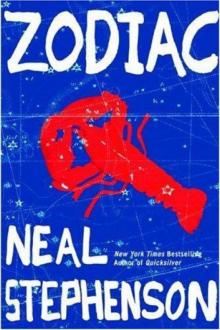 Zodiac: The Eco-Thriller
Zodiac: The Eco-Thriller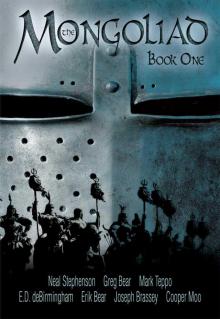 The Mongoliad: Book One
The Mongoliad: Book One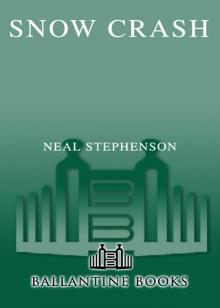 Snow Crash
Snow Crash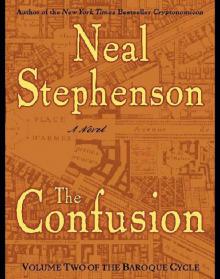 The Confusion: Volume Two of the Baroque Cycle
The Confusion: Volume Two of the Baroque Cycle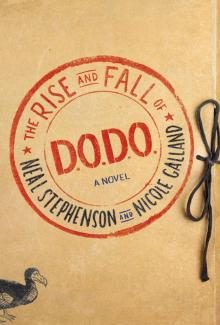 The Rise and Fall of D.O.D.O.
The Rise and Fall of D.O.D.O.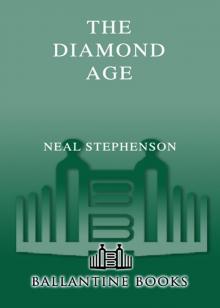 The Diamond Age: Or, a Young Lady's Illustrated Primer
The Diamond Age: Or, a Young Lady's Illustrated Primer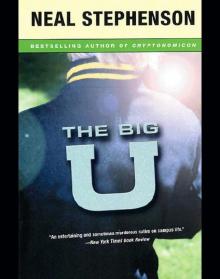 The Big U
The Big U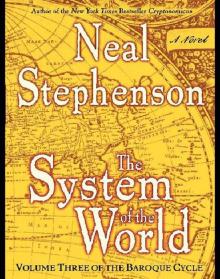 The System of the World: Volume Three of the Baroque Cycle
The System of the World: Volume Three of the Baroque Cycle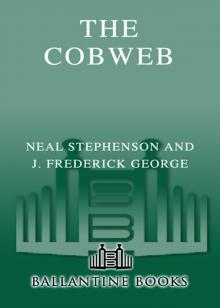 The Cobweb
The Cobweb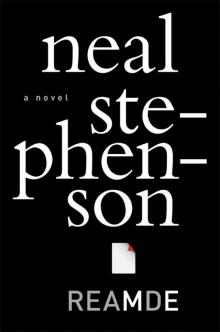 Reamde
Reamde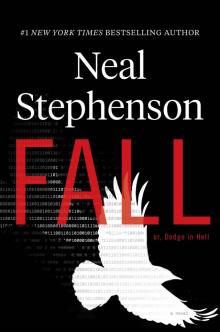 Fall; or, Dodge in Hell
Fall; or, Dodge in Hell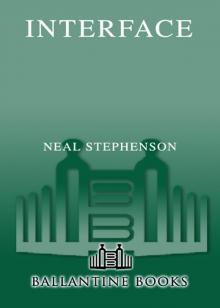 Interface
Interface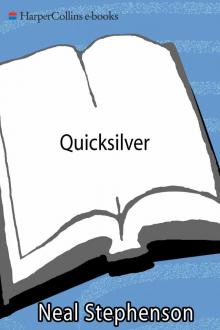 Quicksilver
Quicksilver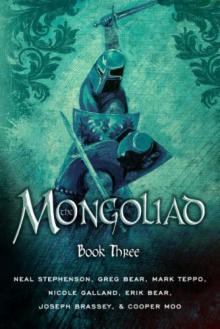 The Mongoliad: Book Three
The Mongoliad: Book Three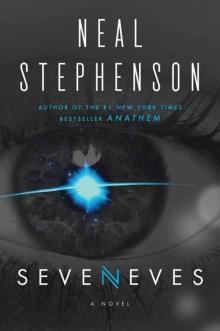 Seveneves
Seveneves Atmosphæra Incognita
Atmosphæra Incognita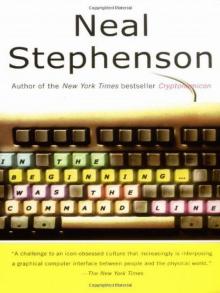 In the Beginning...Was the Command Line
In the Beginning...Was the Command Line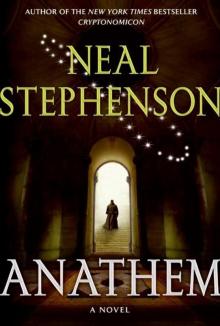 Anathem
Anathem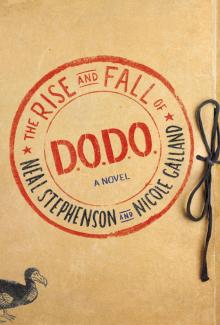 The Rise and Fall of D.O.D.O.: A Novel
The Rise and Fall of D.O.D.O.: A Novel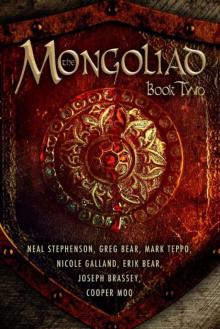 The Mongoliad: Book Two
The Mongoliad: Book Two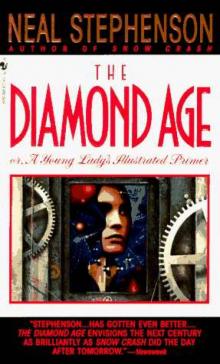 Diamond Age or a Young Lady's Illustrated Primer
Diamond Age or a Young Lady's Illustrated Primer THE System OF THE WORLD
THE System OF THE WORLD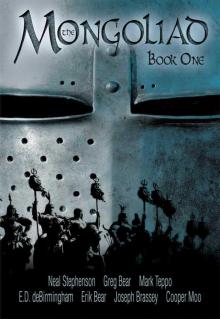 The Mongoliad: Book One tfs-1
The Mongoliad: Book One tfs-1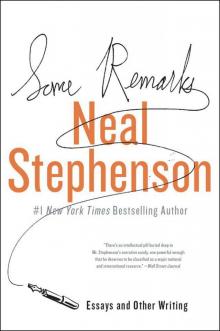 Some Remarks: Essays and Other Writing
Some Remarks: Essays and Other Writing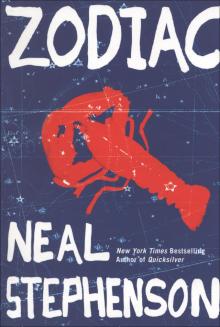 Zodiac
Zodiac Spew
Spew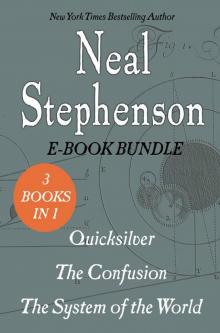 The Baroque Cycle: Quicksilver, the Confusion, and the System of the World
The Baroque Cycle: Quicksilver, the Confusion, and the System of the World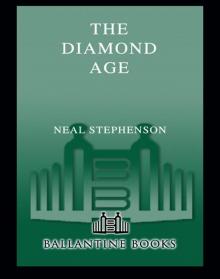 The Diamond Age
The Diamond Age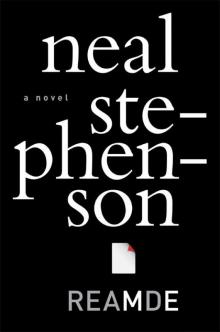 Reamde: A Novel
Reamde: A Novel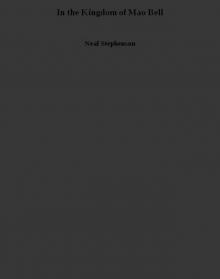 In the Kingdom of Mao Bell
In the Kingdom of Mao Bell Mother Earth Mother Board
Mother Earth Mother Board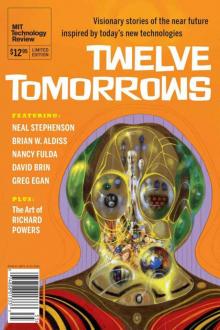 Twelve Tomorrows - Visionary stories of the near future inspired by today's technologies
Twelve Tomorrows - Visionary stories of the near future inspired by today's technologies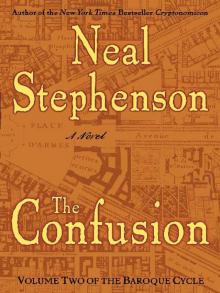 The Confusion
The Confusion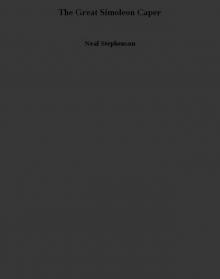 The Great Simoleon Caper
The Great Simoleon Caper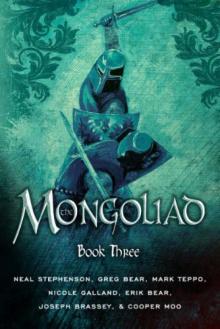 The Mongoliad: Book Three tfs-3
The Mongoliad: Book Three tfs-3